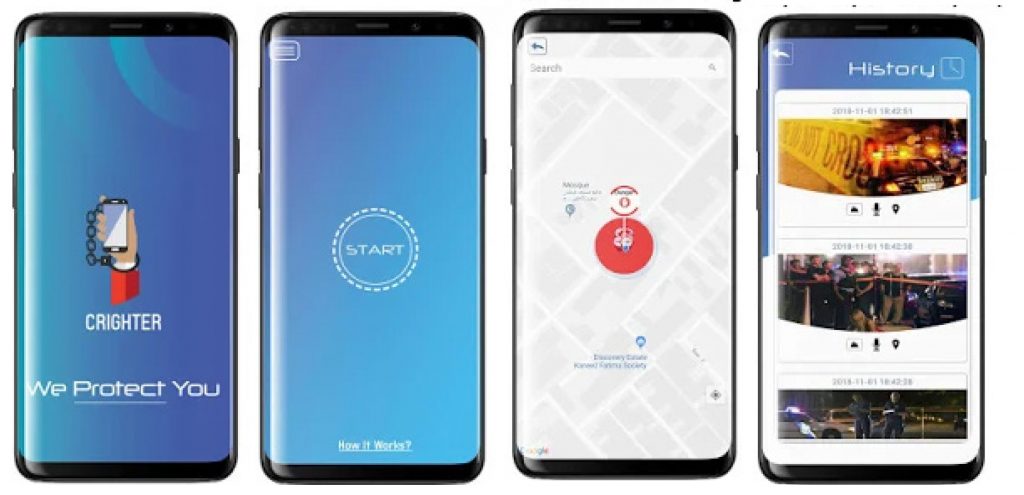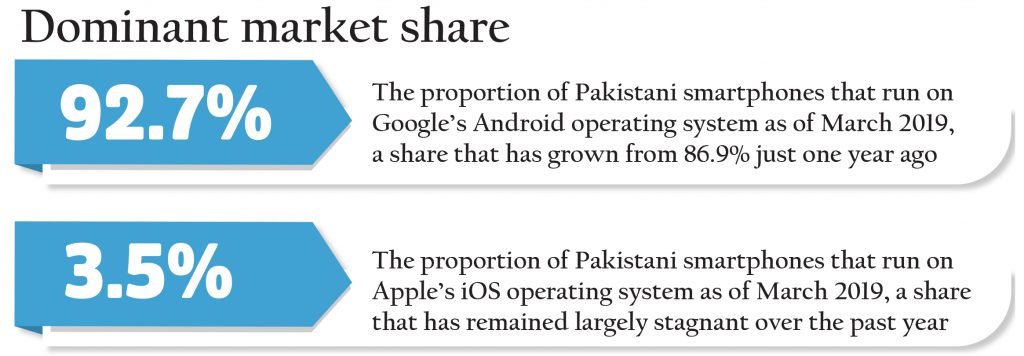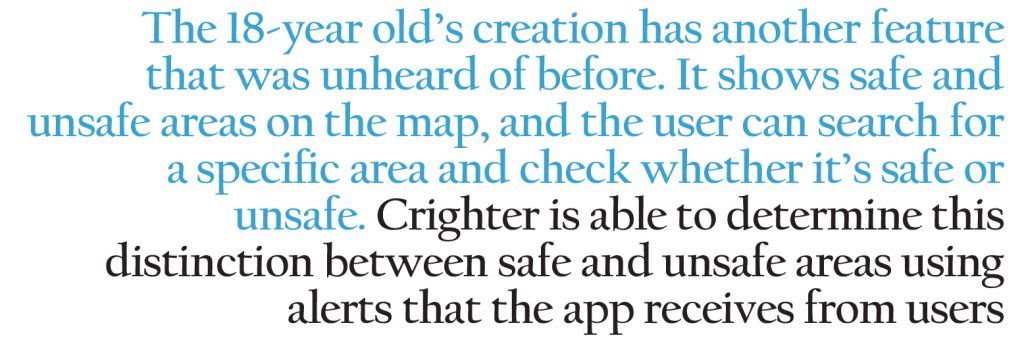What would you do if you are walking down the street and saw a fight break out? For 18-year-old high school student Faizullah Arain, as he witnessed the fight on a street in Multan just over a year ago, the reaction that came to him was not to fight or flee. It was to create an app that would allow people to report an unsafe situation instantly to people whom they trust, along with their location, to help keep them safe, as well as inform others of an unsafe situation so that they can avoid such an area, if possible.
Crighter is an Android application available for free on the Google Play Store, and it allows people to report unsafe circumstances they are encountering to people who they trust. The app calls this trusted person an “authority”, whom the users themselves designate and enter the contact information for.
After the initial, relatively simple, set up process, use of the app itself is relatively straightforward. All a user of the app needs to do is press their device’s power button three times to activate the emergency function of the app. Once that function is activated, the app immediately sends a text alert with the location of the user to the designated trusted “authority”. In addition, the app also activates the back camera of the phone and takes five photographs and records audio for five seconds, and sends those pictures in an e-mail to the trusted “authority” as well.

The goal is to create a visual and audio record of the incident, as well as record its location, so that a person’s family or loved ones are at least informed of any potential dangers, which in turn may be information they can pass on to law enforcement should matters escalate.
“When I was researching for similar apps, I found tracking apps but there was no app that included pictures and audio too,” said Faizullah, in an interview with Profit. “It was then that I decided to include pictures and audio and make this a first of its kind app in the market.”
Why not have those pictures and audio sent directly to the police or other law enforcement agencies? After all, it is their job to keep people safe, and data from this app could be useful to law enforcement departments in allocating scarce resources and cracking down on crime. The concern, Faizullah says, is false alarms and overwhelming the police with too many reports for them to be able to handle and prioritise.
“If an alert is sent directly to the police, there’s a chance it could be a false alert. When the designated [trusted] ‘authority’ gets an alert, he or she can call the user and then if required, call the police,” explained Faizullah. He also added that the police’s job will be made more cumbersome in the future if every alert is sent directly to the police. “It will only make the police’s job harder if every alert is sent directly to the police, especially if the app’s usage increases and daily alerts could be in the thousands,” he said.
Crighter isn’t Faizullah’s first mobile application project. Calling himself Pakistan’s youngest game developer, Faizullah made JumpNCatch, an Android game for children, in 2017, when he was just 16 years old.
”As a kid, I was never interested in playing sports, preferring instead to spend time on computers,” said Faizullah. That interest manifested into something concrete when he was motivated by his school teacher in eighth grade. “My teacher told me that information technology is the only field in which you can start working and earning before officially getting a qualification or a degree,” said Faizullah. It was then that he started attending a computer learning institute and started to hone his skills for more professional work.

As his second product, Crighter appears to be a relatively well-thought out product. One potential user concern that Faizullah wanted to address directly is data privacy and security, particularly given the fact that the app can record audio and take pictures through the user’s phone. The solution for Crighter is end-to-end encryption that does not allow anyone but the sender and recipient to access the data.
“The data that the app records is shared in an encrypted conversation between the user of the app and the [trusted] ‘authority’ set by the user. At no point is the user’s data shared with the developer of the app,” explained Faizullah.
The 18-year old’s creation has another feature that was unheard of before. It shows safe and unsafe areas on the map, and the user can search for a specific area and check whether it’s safe or unsafe. Crighter is able to determine this distinction between safe and unsafe areas using alerts that the app receives from users.
“So what the app does is that it categorises safe and unsafe areas based on the alerts it receives from app users. Then a ratio is calculated according to alerts received from different areas and the app automatically updates the map,” explained Faizullah. What this means is that a safe area is designated safe either because there have been no alerts from that area or there are no users of the app in the area. Faizullah says the map will improve and upgrade automatically as users of the app increase over time.

The app certainly appears to be gaining in popularity. Since launching in January 2019 has already garnered over 5,000 downloads from the Google Play store. “The app currently has around 5000 downloads and it keeps growing on a daily basis. It was launched for testing in December 2018, but came in the market in January this year,” said Faizullah.
Crighter is currently available only on Android phones through the Google Play store and not on the Apple app store for iPhones. This, however, is not an oversight on the part of Faizullah: according to data from StatCounter, a global data company on internet and communications data, the proportion of Pakistani cellphone users who have an Android-based phone is just under 93% as of March 2019. By contrast, iPhone users account for just 3.5% of Pakistan’s mobile phone market.
The app’s launch comes at a time when the use of mobile broadband internet in Pakistan is rising rapidly, with an estimated 65 million users as of February 2019 who have access to such connections, according to the Pakistan Telecommunications Authority (PTA). And Crighter views all of those tens of millions of people as its prospective market.

Even with the huge potential market available for the app, Faizullah’s focus right now is not on making money through it. But that does not mean he is not aware of the ways his app can generate revenue. “The app can be paid, or it can have optional paid features inside it, or the app can make money through advertisements. But I have no plan of doing any of that,” said Faizullah.
Instead, he’s looking for an investor that’ll help him promote the app to a bigger market. “My focus right now is not on making money, but to get an investment in order to market the app. Currently I’m marketing the app using Facebook and Google ads, and that too only in Pakistan. If I can find the right investor, I’ll use the money to market the app globally, especially in the Middle East and the rest of Asia.
Faizullah’s costs in developing the app were relatively low, paying for a few freelancer developers to help with the coding of the app, which took just over a year to complete.
Faizullah does however have a plan of making money using the app itself but he does not want it to share with the app’s users at this time. “There will come a time when we will implement the plan in the app and start earning. The app will be free even then but we’ll also be earning,” he said.
Faizullah sees a bright future for the app. But he says his biggest challenge right now is to find the right investor that isn’t look for short-term gains but focuses on long-term returns. He thinks that with the help of the right investor, his creation can soar to great heights. Having said that, Faizullah also emphasized that the app will never be restricted for anyone, as it was made for the people and will remain for the people.




